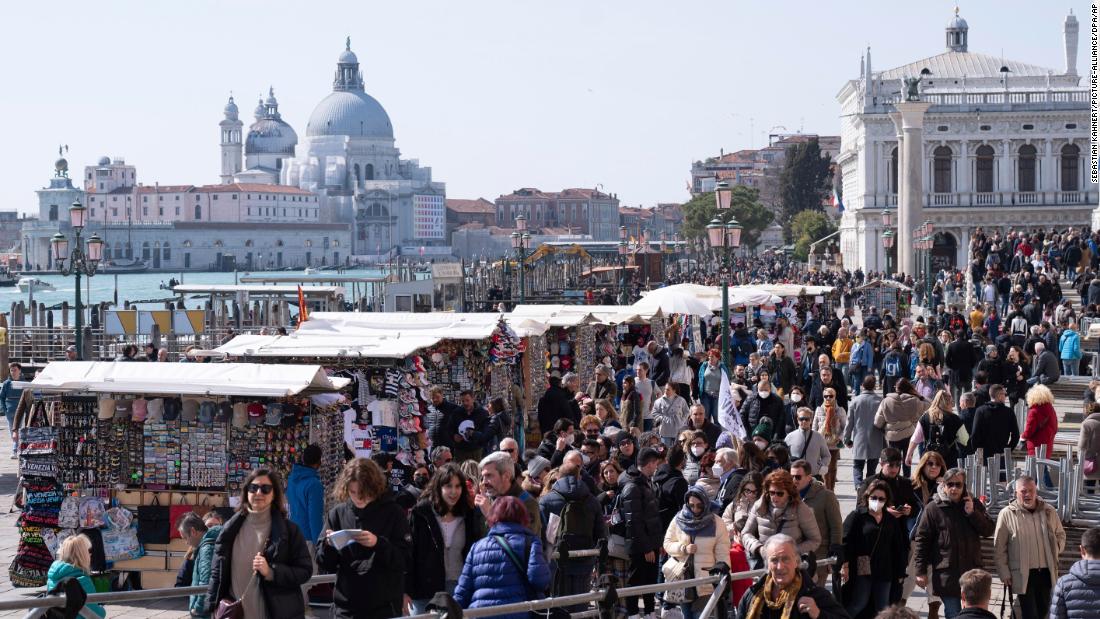Venice opens a reservation system to reserve entry to the city
(CNN) — As a poster child for overtourism, Venice has long been a city of queues, uncomfortable overcrowding and Airbnbs springing up like mushrooms that are blamed for driving people out of the city.
The proposed solution? To be the first city in the world to require an entry fee, with a reservation system to be put in place for day-trippers, and only those who hold reservations allow entry into the city. The plan was announced before the pandemic and then put on hold as the city was devastated by a shortage of tourists.
Now the town’s mayor has announced that visitors can make reservations starting this summer, with an entry fee due from January 2023.
After a sweltering Easter weekend — which saw 120,000 tourists flood the town of 50,000 on Saturday, local police said, with numbers rising to 158,000 on Sunday, according to Smart Control data Room — Mayor Luigi Brugnaro announced that the reservation system is moving forward.
“We will be the first in the world for this difficult experience.”
The councilor responsible for tourism, Simone Venturini, told RAI, the public television channel, that in a few weeks the city will launch a “very simple and fast” portal for online reservations.
“This summer it will be possible to book a day trip, and in 2023 we will start the contributo di accesso” – or entrance fee – he said.
Venturini said the pandemic had given city officials pause.
“Covid has made us realize that what was an everyday occurrence before covid is no longer acceptable — the mentality has changed, as has the sensitivity [towards crowds],” he said.
The reservation system will be on a voluntary basis for 2022, he said, adding that visitors will be offered “incentives” to use the portal, including queuing status at various sites and museums. It will be run on a trial basis, to implement the mandatory system in January 2023.
Having the reservation system “will give us the chance to know how many people are scheduled for that day and to calibrate the services according to the number”.
Venturini said the portal will also alert people that they might want to change their mind.
“We can say, ‘Dear visitor, we do not recommend coming on this date because it is Ferragosto [August public holiday] or Easter – it will be very crowded, it will prevent you from having a peaceful visit, and if you do it a week later, you can enjoy your visit more,” he said.
When entry fees go into effect in January, they will range from €3 ($3.25) on quiet days to €10 ($10.85) on peak days.
The charge will only be due for day trippers – anyone staying overnight in Venice itself is exempt. The idea is to deter notorious “hit and run” daytrippers who descend on the city, spend little money in local businesses and leave their trash behind.
“Our borghi [walled towns] and historic centers really suffer from excessive day-trippers on certain days of the year,” Venturini said.
“The message we want to convey is that Venice is a city that lives slowly, at different paces from anywhere else. It is fragile, unique and needs an approach from visitors that does not consist to come in, take a photo and leave’.”
He said visitors should take a “slower, more respectful approach”.
Venturini also predicted that Venice would not be the last to introduce a fee.
“I think many other European cities that live with a significant number of day trippers are looking to us to understand how they can introduce [a similar scheme],” he said.
The fees have intrigued visitors so much that the number of visitors has increased from 40,000 in 2009 to 1 million in 2018.
Main image: Sebastian Kahnert/picture-alliance/dpa/AP Images


Comments are closed.